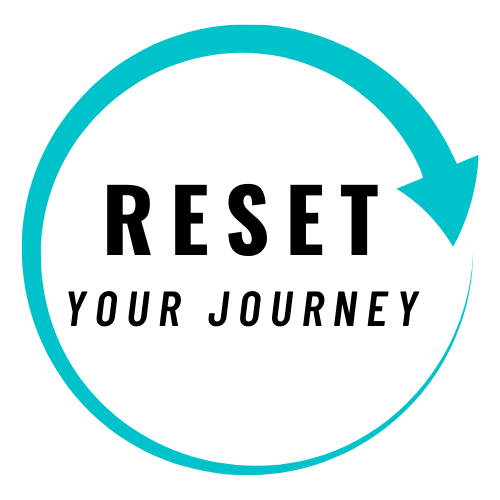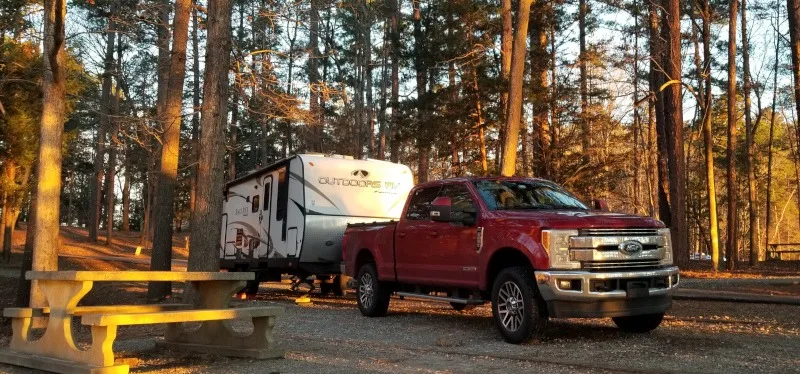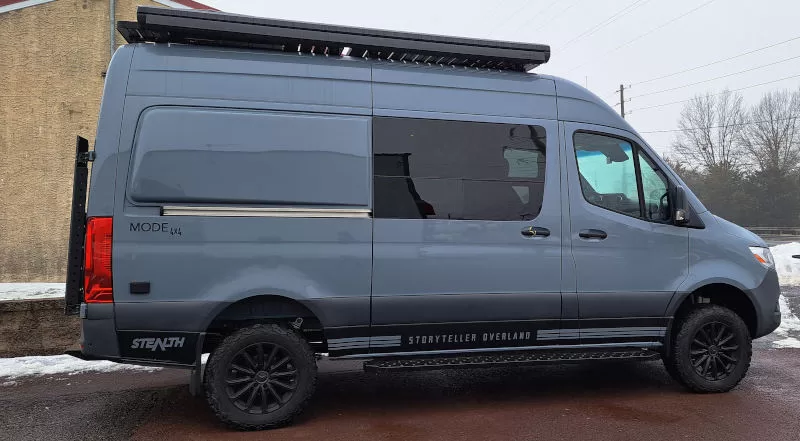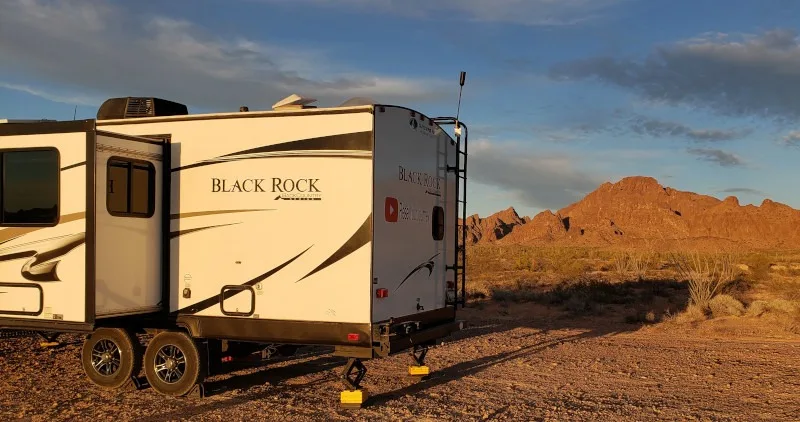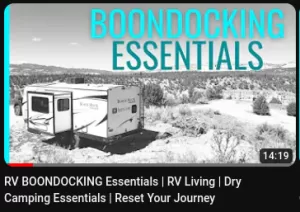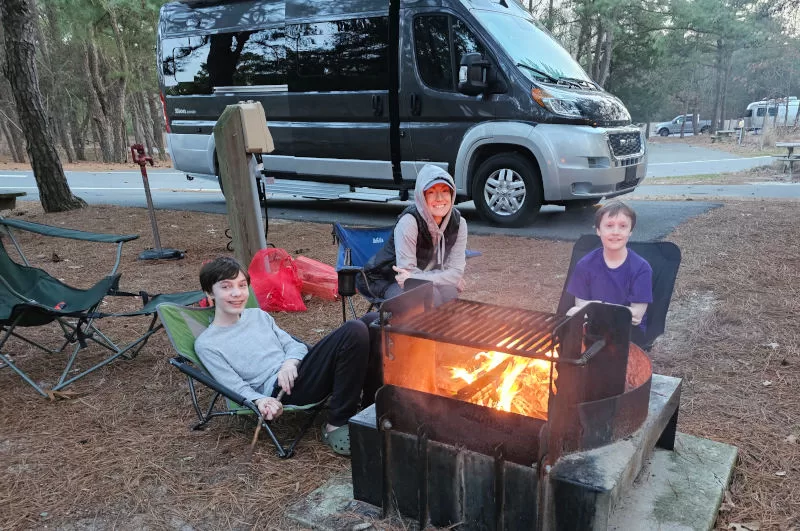Last Updated on 09/08/2024 by Glynn Willard
How To Choose An RV
We can make the RV selection process easier by systematically narrowing down the different types of recreational vehicles that are best for you.
- Determine the vision you have for you and your family while RVing.
- Decide which standard features are important and necessary and will accommodate your vision.
- Next decide which type of RV is the best RV for you and your family based on its type and its standard features.
- Narrow down the list of the quality manufacturers who assemble your ideal RV type.
- Determine the most suitable floor plan allowing for enough living space for everyone included.
- Lastly, begin shopping RV Trader and RV dealerships in your region for the best RV for you.
We’ll dive into more detail for some of these steps below.
Please take them seriously so that you avoid making a large financial mistake.
Let’s get you ready to enjoy your new or new to you RV out on the open road!
What’s Your RVing Profile And Vision?
First things first! Before you waste time shopping for the wrong RV, let’s figure out what type of recreational vehicle best suits you.
This is where your vision of how you plan on camping with your RV comes into play.
Do you see yourself:
- Full-time RV living?
- Traveling around on long trips with a large family?
- Going from RV parks to state parks to national parks?
- Stealth camping anywhere you like?
- Overlanding in an all-terrain RV?
- Boondocking the majority of the time?
- A combination of all the above as a weekend warrior?
- Or do you just want an RV for day trips?
Many of these visions/plans require very different RVs.
Let me make this very important point:
Sometimes the reality of your vision does not match your expectations.
What does that translate to?
Prioritize the most important thing when shopping.
For example, you’re a family of four, but you see yourself stealth camping in one of several different types of camper vans.
I can tell you as an experienced RVer, squeezing a family of four into a small tin can gets old fast!
The Right RV For The Number Of People In Your Family

Make sure everyone in the RV has “their own space.”
This is the most important and first aspect to consider before narrowing the list.
If there’s one or two of you, the sky’s the limit.
You can get away with a small class B van, short towable RVs, pop-up campers, a variety of truck campers, or a behemoth class A rig.
But if there are three or more of you, additional consideration must be placed on the size of the RV.
Yes, you can make anything work.
But now tell that to the family members who are cramped or uncomfortable for most of your road trips.
Follow me?
One miserable person can “sink your ship” quickly. Let’s avoid that situation.
So if there are three or more, consider:
- An appropriately sized travel trailer. This will give you the most bang for the buck, just be cautious about your tow vehicle selection.
- The right sized fifth wheel. Fifth wheels are very livable, but require close to a one-ton pickup truck.
- A moderately sized class C motorhome. You may need an additional vehicle with you on your road trips.
- Medium or large class A RV. Again, you may need an additional vehicle with you for your travels.
- Toy haulers in any of the above versions. They offer a lot of storage space that can be customized to your needs.
Once you’ve established the best type of RV for the number of people in your group, we can then move on to fitting the right RV to your profile/vision.
Type Of RV For Your Profile
Let’s list the different types of RV visions and place the most suitable RV into each category.
- Staying In RV Parks And Campgrounds
You really have no limit here, but you might prefer to focus on the RVs that are the most livable.Smaller RVs are great, but they obviously don’t offer much space.
- Large travel trailers come pretty close to 5th wheels with all the amenities.
- Big class A or class C RVs are very spacious. Both are a popular choice if you want comfort and ease of use.
Large fifth wheels offer a large kitchen, all the comforts of home, and a lot of space.
Durability, livability, good insulation, and a high cargo-carrying capacity are the keys to living full-time in an RV.
Higher-end towable RVs allow you to always have your exploration vehicle with you.
This applies to both fifth wheels and travel trailers.
In fact, toy haulers offer very livable spaces with a high cargo-carrying capacity.
Motorhomes will require you to tow an additional vehicle if you plan to do a lot of exploring, but this might be worthwhile if you stay in one location for a longer duration.
A motorhome of any class is very livable and comfortable for travel.
You are limited to shopping only for class B motorhomes (campervans) that are self-contained.
If there are more than two of you, stealth campervans are not a good option.
Many of the best-dispersed camping locations require an RV that can navigate rough terrain on public lands.
Yes, you can bounce around to different Walmart parking lots, but that’s not exactly appealing.
Your best options for RV’s that you boondock in most of the time are:
- Truck camper: Not only can you navigate rough terrain, you can remove the camper from the truck bed, allowing you to explore while saving your boondocking location.
- Bumper tow travel trailer: A trailer with good suspension, high ground clearance, and large fresh/waste water tanks is a great way to take your family boondocking.
- Campervan: A campervan with high ground clearance such as a Storyteller or Modvans will get you to some beautiful remote locations for dispersed camping.
- Pop-up trailer: These small trailers are usually well equipped to maneuver the rough terrain.
This is the most limiting camping style when considering which RV is right for you.
The following types are best suited:
- Small overlanding trailers: Special hitches with additional articulation and solid suspension make overlanding trailers a great option.
- Truck campers: A lightweight camper placed on a truck that’s outfitted for extreme terrain means more exploration.
- Overlanding campervan: A lifted van with plenty of battery capacity, large freshwater and waste tanks, and a way to replenish power (solar panels) will get you through most terrain to some great camping locations.
- Day Trips
I have to admit, it’s pretty awesome taking day trips in our campervan.Our bathroom and kitchen are with us the whole time offering conveniences that few other vehicles can offer.
That said, professionally built campervans are very expensive, so that’s a high price to pay for the convenience.
But, a class B motorhome that comfortably seats all the passengers makes the perfect day trip RV.
Some Of The Better Quality Manufacturers
First, let’s massively narrow the list by only spending time looking at manufacturers that build quality RVs.
This might mean that buying a used RV is the only option. But I encourage this anyway.
There are so many manufacturers on the market that it can quickly become overwhelming.
Based on our experience living the RV life full and part time, here’s a list of the manufacturers that assemble quality RVs.
This list is not exhaustive.
I realize that every manufacturer can put out lemons or have a production year of less-than-stellar quality RVs.
But that’s standard in most manufacturing.
This list is in no particular order and yes, we’ve experienced all of them on the list in one way or another.
- Outdoors RV
- Arctic Fox
- Entegra
- Tiffin
- Renegade
- Storyteller
- Noovo Vans
- Modvans
- Show Hauler
- Roadtrek
- Oliver Travel Trailers
- Prevost
- Pleasureway
- ATC
- Airstream
- Dynamax
- Kimberly Kampers
- Lance
- Nash
- Newmar
Several of those listed only make one kind of RV, so explore each one until you find a few that fit your criteria.
And of course, new manufacturers are springing up all the time, so do your research.
Which Floor Plan Offers Enough Space?
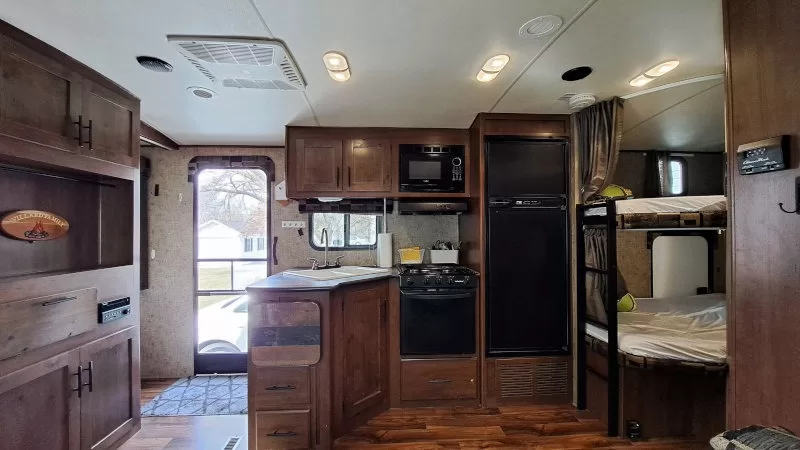
There’s not much space with which to work, but it’s more than our campervan.
There are a few points that are important when considering floor plans:
- Each person should have their own personal space.
- The less you have to alter an area for multi-use, the better, i.e., setting up and breaking down a bed gets old quickly.
- Consider a model with bunk beds if you have kids.
- Set up should be quick and easy allowing more time to enjoy the great outdoors.
- You’ll need an area to lounge, work, eat, and sleep. If the RV is lacking any of those, it will be less enjoyable. Read that twice.
Every quality manufacturer offers a variety of floor plans that will meet your needs.
RV Cost Of Operation
One does not need to be a rocket surgeon to realize that operating an RV can be expensive.
If you have infinite monetary resources, the high cost of operating a large diesel class A will be fine.
But not if you’re pinching pennies.
If your resources are finite like ours, just know that the smaller the RV, the less expensive (relatively).
Towing our travel trailer used a lot of diesel (11 mpg), but our small campervan gets an average of 16 mpg of gasoline.
That’s a big difference in the final cost!
The insurance was less expensive on our trailer than our class B, but the insurance on the tow vehicle was relatively high yielding a higher cost.
As you can see, there are a lot of variables to consider when discussing the cost of RV operation, not to mention the preventative maintenance.
I just want you to be financially aware while you’re considering and shopping for your first RV.
Not Sure What You Need For Your RV?
Shopping For Different Options

Decisions, decisions….
Once you have your list narrowed, it’s time to find those RV’s you’re considering in your region.
The easiest place to start is RV Trader or one of its online competitors. The filters make it easy to refine your search.
Then when you have your list of a few to tour, start with nearby dealerships so you can do some comparison shopping.
The more refined your search, the less time you’ll waste.
On a side note, before you contact a private seller, ensure you’re serious about their RV if you’re considering a used RV.
- Find The Perfect RV And Explore Different RV’s At An RV Show
Explore all the RV’s at an RV show!
If it’s within your means, making a pilgrimage to a large RV show is the best way to openly explore different types of RVs without the pressure.But fair warning, if it’s your first time attending an RV show, be prepared as it can be overwhelming.
It’s also an opportunity to find an RV dealer with whom you feel comfortable.
You can also secure some great deals if you’re already in the “ready to buy” phase of RV shopping.
- Finances And RVs
Unless you have a substantial income, factoring in monthly payments for an RV is not a good idea.Consider buying used and paying cash.
There’s a built-in upkeep cost for RVs that can get pretty high depending on the RV.
Again, if you’re pinching pennies, pay cash for a used rig.
There was no shortage of families we encountered during our travels who were upside down in their RV payments.
Several were desperate to unload their RV since they had lost their employment.
Pay cash and avoid that situation.
- Handeling Dealerships
Use caution and know your boundaries when shopping at a dealership.
Yes, your dealer can help you find the best option but pay close attention.First, they’ll show you an RV that’s “just not suitable.”
Next, they’ll show you one that best fits your needs and is within your price range.
Finally, and “just because you’re there,” they’ll show you a palatial, larger RV that is “dream-worthy” and out of your price range.
Then you’ll be redirected to the middle RV and the game of “someone else is considering that RV” will begin.
You can fill in the rest of the story.
This scenario played out for us with almost every dealership we visited.
We switched gears and bought our first RV from a private seller.
Best decision ever!
For our second RV, I found what I wanted online and negotiated everything via phone and email with the understanding that we would purchase it if everything checked out during our appointment.
Seeing the dealership’s hand of cards before even setting foot there in person made for a very smooth transition.
If you can match this situation it will work in your favor.
One final note on handling dealerships.
Make sure you spend a lot of time having them review the RV with you and take out your phone to video the process.
It will not only make your life easier, but it will “lubricate” the warranty process when something needs addressing.
- Should You Have The RV Inspected?
Yes, especially if you’re new to any RV type and it’s a used RV.There are a lot of specifics that should be checked before delivery, which we did not understand until after several years of RVing full-time.
This is also an option if you’re buying a new RV. And it’s not unheard of in the industry.
Having the inspection done before taking delivery means that warranty issues will be addressed before you even do your final walk-through.
Some of them might not even have been noticed without an inspection.
It’s not free to have the RV inspected by an independent contractor, but the fee will pay off in the long run.
Owning A Travel Trailer Pros And Cons
After being travel trailer owners for three years, two of which were full-time, I feel like I should disclose some pros and cons of ownership.
This way you can make an informed decision on your new rig if you decide to purchase a new travel trailer.
First, the cons of owning a travel trailer:
- You’ll need a heavy-duty tow vehicle.
- Even if it’s a small travel trailer, it still takes a lot of work to prepare it for travel.
- If you haven’t towed before, there’s a steep learning curve for towing your first travel trailer.
- The wheels need a lot more regular maintenance than wheels on a motorhome.
Second, the pros of owning a travel trailer:
- You always have an exploration and errand vehicle with you when towing a trailer.
- You can get a lot more “recreational vehicle” for the price.
- The barrier for entry into the RV lifestyle is a lot lower than class A and class C motorhomes.
- Repair costs are typically less than RV’s with a motor.
- RV maintenance is easier and less expensive on a travel trailer than on a motorhome.
- RV insurance is inexpensive for a travel trailer.
- A properly built and equipped travel trailer can navigate rough terrain moving your camping experience into more remote areas.
- There’s a really large RV community to support you with your travel trailer travel style.
We still prefer our travel trailer camper since we’ve owned both a travel trailer and a class B motorhome.
Tips For Your New & First RV
Once you have your new or “new to you” RV in your driveway, the first thing you should do is read the manual (twice).
We covered the first things to do in our article:
First Time RV Owner Checklist & Guide For New Owners.
Rather than repeating that article, I encourage you to give it a few minutes of your time.
Wrapping Up Which RV Is Right For Me
Sometimes, finding the best camper for you means being in the right place at the right time.
What does that mean to you?
The longer you research RVs and explore them in person, the more likely you are to find your perfect RV for your long trips.
I hope we’ve helped give you some guidance on how to narrow down the overwhelming amount of RVs on the market.
If I can leave you with one thing:
Focus on the comfort of every family member in the RV as your first priority.
Have you found your perfect RV?
Meet the author.
We appreciate any help in bringing you great content. Donate or buy us a coffee on our Ko-Fi site. Or subscribe to our YouTube Channel.
Thank you so much for being here!
